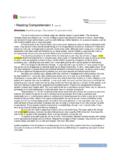Transcription of INTERMEDIARY SERVICES - Justice Home
1 INTERMEDIARY SERVICES . PROVIDED IN COURTS. WHAT IS THE ROLE OF THE INTERMEDIARY ? The role of the INTERMEDIARY is to convey the evidence related questions from the prosecution or the defence to the child in a manner which is understandable to the child. In carrying out this duty, the INTERMEDIARY has two specific functions: o To protect the child against hostile cross-examination and o To assist the child in understanding the questions posed. The child will, therefore, only talk to the INTERMEDIARY during the court proceedings. HOW DO CHILDREN TESTIFY IN COURT? The child witness gives evidence in a room separate from the courtroom. This room is referred to as the witness testifying room and usually located next to or very close to the main courtroom. It is informally arranged with chairs where the child and the INTERMEDIARY can sit. A video camera or a one-way mirror is attached to the wall opposite from where the child is seated. It facilitates communication between the witness testifying room and the main courtroom while the child is giving evidence.
2 The INTERMEDIARY is provided with earphones to enable him or her to follow the proceedings in the courtroom. The INTERMEDIARY will hear the questions and relay these to the child. The child's answers will be captured on the live video link. The child does not see the courtroom or the accused nor hear anyone from the court. The courtroom is provided with television sets or has one-way mirrors to enable people in the court to view and hear the child and the INTERMEDIARY who are in the witness testifying room .The video is live, which means that the members of the court will see and hear the child and the INTERMEDIARY as they speak. No videotape recording is made of the child giving evidence. 1. 2. ARE ALL CHILDREN ALLOWED TO USE THE SPECIAL FACILITIES? These special facilities are not automatically available, and can only be used in certain circumstances. They are only available to persons under the mental or biological age of 18 who would be exposed to undue mental stress or suffering if they were to testify in court.
3 WHAT DOES UNDUE MENTAL STRESS MEAN? In order to make use of an INTERMEDIARY and closed-circuit television/. one-way mirror, it will have to be shown that the child will experience MORE than the normal stress associated with testifying. Children express stress in different ways and these could include nightmares, bedwetting, change in behaviour, fear, deterioration in schoolwork and depression. Children, who show any of these symptoms or similar symptoms, are more likely to experience undue stress when testifying in court. For that reason, it is important that this information be conveyed to the prosecutor. HOW DOES ONE PROVE UNDUE MENTAL STRESS? The prosecutor will have to prove to the court that the child will experience undue mental stress or suffering during the court process. The prosecutor will require the child to undergo an assessment. The prosecutor will refer the child to a social worker for an assessment and this will usually be arranged by the investigating officer.
4 The social worker will consult with the child to determine whether the child will suffer undue mental stress if he or she should testify in court, and will produce a report with the findings. This report will be used in court to prove that there is a necessity for the child to testify from the special courtroom and use the facility of an INTERMEDIARY . 3. 4. Where a mentally disabled witness is concerned, the same process will be followed. WHO CAN ASK FOR AN INTERMEDIARY ? Since an INTERMEDIARY is not automatically appointed, the general rule is that the person who is calling the witness should apply to court for the appointment of the INTERMEDIARY . Although the court can suggest the appointment of an INTERMEDIARY if it sees that the child is experiencing undue stress when testifying, usually this is done by the Prosecutor. Parents or caregivers should approach Prosecutors to find out whether the child can make use of an INTERMEDIARY and indicate if they have observed any signs of stress.
5 DOES THE CHILD EVER HAVE TO GO INTO THE MAIN COURTROOM? Generally, the child remains in the witness testifying room and does not have to appear in the main courtroom. However, should the child need to identify an accused, he/she will be taken into the main courtroom. In case this is required, the INTERMEDIARY or a court orderly will accompany the child into the main courtroom. CAN INTEMEDIARIES BE USED IN THE CHILDREN'S COURTS? A Magistrate has the discretion to request that an INTERMEDIARY be provided to a child appearing in children's court if he or she is of the opinion that the case will cause exposure to undue stress or suffering. 5. Notes: 6. FOR MORE INFORMATION CONTACT: The Department of Justice and Constitutional Development: The Office of the Chief-Directorate: Promotion of the Rights of Vulnerable Groups The Office of the Victim Support and Specialised Court SERVICES Private Bag X81, Pretoria, 0001. Tel: (012) 315 1830/1868, Fax: 086 675 2621.

















